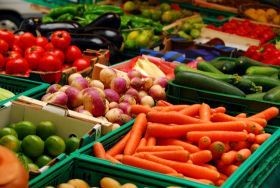Blog
What IS a Healthy Diet, Anyway?
- November 27, 2023
- Elijah Hawken

Recently a patient confided in me that she didn’t really know what a healthy diet was. I assured her she was not alone in not knowing!
Looking out the window of my acupuncture and Traditional Chinese Medicine clinic in Dallas, Texas, it is clear that it is November: the leaves are turning and the sky is overcast. I felt like this was a good time for this article, as we are in the midst of a holiday season which is known for the food!
One thing to keep at the forefront of mind is that the food industry is a multi-billion dollar industry. There is a lot of money being spent to convince you that a certain processed food product is better for you than another food – and it may not be true.
If you have studied western nutrition (in my Masters Degree program – a Masters of Traditional Oriental Medicine - we were required to complete both western and Chinese medical nutrition classes), you will know that western medical ideas about healthy eating can change every couple of years – it’s no wonder it can be confusing.
There are a handful of overarching ideas that can be really helpful when you’re trying to figure out how and what to eat.
1. Avoid highly processed or “ultra-processed” foods. Check out the ingredients label. If the food doesn’t have a label at all, it’s probably not highly processed. For instance, a raw head of broccoli is not highly processed, but a can of soup may be. Take a look at the ingredients. If there are things in there that you won’t commonly find in someone’s kitchen pantry, it’s probably highly processed, and best avoided. Make sure you check out any non-dairy “creamers” you use in your daily coffee! Here’s a helpful article from Harvard: https://www.health.harvard.edu/blog/what-are-ultra-processed-foods-and-are-they-bad-for-our-health-2020010918605
2. Eat the widest variety of whole foods you can. This means rather that eating the same foods everyday, mix it up. Try new things. Even adding a pinch of an herb or spice to your dish can benefit your gut microbiome, and thus your overall health.
3. Get the minimum requirement of fiber – from foods, not supplements. The recommended amounts are 35 grams per day for men, and 25 grams per day for women.
Very few people I see in my Dallas acupuncture clinic are getting enough fiber regularly, and fiber can have a big impact on your health. From helping to reduce unhealthy cholesterol levels to stabilizing blood sugar to helping you feel more full while eating less, fiber is a powerhouse. A great tool to help you track your fiber is an online food journal app. You’ll start to learn which foods are higher in fiber than others, and you can then incorporate more of those in your diet. Admittedly, using a food logging app can be labor intensive, but my favorite one, MyFitnessPal (it’s free! www.myfitnesspal.com) saves your foods, meals, and even recipes, so the more you use it the easier it is to log foods. As an aside, I would not recommend using the calorie estimator on this app for weight loss goals. It tends to estimate fewer calories than people need to be healthy. Please only use the app to log your foods, track your fiber, and maybe track your water!
4. Make your diet vegetable heavy. Always have the largest portion on your plate be the veggies.
5. Include seeds, nuts, legumes, whole grains, lots of veggies, some fruit, and a little fish, meat and egg if you choose to eat those foods.
6. Make sure you are drinking plenty of pure water. A nice way to ballpark a good amount for yourself is to divide your weight in half, and drink that number in ounces of water. For example, someone who weighs 120 pounds could drink 60 ounces of pure water per day. I say pure water because this number does not include other beverages like coffee, tea, sodas, etc. I suggest people keep their maximum water intake to 100 ounces per day, so if you are over 200 pounds, just stick to 100 ounces of water per day.
7. Here in Dallas, in part because of the “southern diet” (heavy on dairy, margarine or butter, sauces, white flours, fried foods, red meat, sugar, sodas and sometimes alcohol) and in part because our weather is somewhat humid, we can have the tendency to accumulate what acupuncture and Traditional Chinese Medicine calls a Pathogenic Dampness. Because of this, for many locals, limiting sugar and sweets, greasy fried foods, alcohol and dairy products can be beneficial (especially if you have chronic nasal congestion, cough, and phlegm). If you’re curious, try eliminating these foods and see how you feel after a couple of weeks.
Fun fact: Did you know that acupuncture can help with sugar cravings? And that acupuncture and Chinese herbal medicine can be helpful in resolving congestion and coughs?
I hope you have a wonderful fall here in Dallas – and let acupuncture and Chinese Medicine support you in achieving your wellness goals!
Search
Recent Posts
-
Office Protocol in the time of COVID-19 May 07, 2020
-
What IS a Healthy Diet, Anyway? November 27, 2023
-
Happy Autumn!? November 04, 2023
Categories
Book An Appointment
Contact Info
10405 E Northwest Hwy, Suite 322
Dallas, TX 75238
- (972) 804-9113
- Email Us
- Driving Directions
From The Blog
-
Office Protocol in the time of COVID-19 May 07, 2020
-
What IS a Healthy Diet, Anyway? November 27, 2023
-
Happy Autumn!? November 04, 2023






